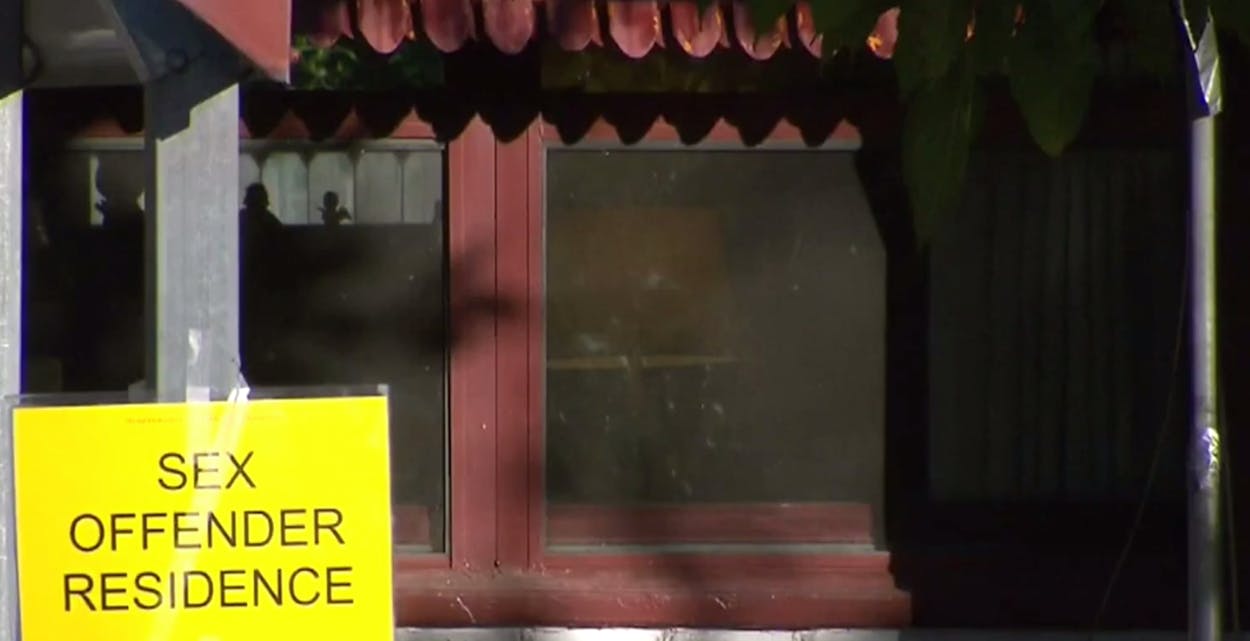Sex crimes are widely considered among the worst moral and criminal offenses in the United States. So much so, the show To Catch a Predator has become a pop culture phenomenon (even if viewers of the show engage in a certain type of Schadenfreude when talking about it). But as with many criminal justice issues, there are shades of gray, even when it comes to how we treat sex offenders after they’ve been convicted. That brings us to the advocacy group, Texas Voices for Reason and Justice.
Texas Voices for Reason and Justice is looking to challenge how 46 general-law cities across Texas are handling residency laws that determine where sex offenders are allowed to live. (A general-law city, aside from being a strange bit of jargon, is a municipality that has a population below 5,000.) Back in 2007, when Governor Greg Abbott was Texas’s attorney general, he made clear that “unless the Legislature expressly authorizes it, a general-law municipality may not adopt an ordinance restricting where a registered sex offender may live” because general-law cities are “created by the State and, as such, possess those powers and privileges that the State expressly confers upon [them].” So general-law cities must follow state law and cannot draw up their own laws or ordinances that determine where sex offenders can live.
As the Houston Chronicle pointed out, a few general-law cities have entered this controversy recently. Krum, a small town near Denton is currently in a legal battle over whether or not the sex offender residency restrictions they enacted in 2012 (that “it is unlawful for a sex offender to establish a permanent residence or temporary residence within 2,000 feet of any premises where children commonly gather”) are unconstitutional. Alvarado, near Fort Worth, just recently had a scuffle over what sex offenders are required to do with signs that identify them during Halloween.
According to the Texas Voices for Reason and Justice’s executive director, Mary Sue Molnar, “research conducted by law enforcement and criminologists has established that, without exception, sex offender residency restriction ordinances do much more harm than good when it comes to making local communities safer for children.”
There indeed have been a handful of studies that question the merit of sex offender registries. Most don’t explicitly say sex offender registries are good or bad, because there isn’t a lot of statistical data to compare recidivism rates for areas with and without a sex offender registry. But a study by the Iowa Department of Human Rights compared sex offenders who were not required to enter any sort of registry—as their offense was committed before any law was in effect—with sex offenders who were required to participate in the Iowa Sex Offender Registry program. The report comes to the conclusion that there were “no statistically significant differences in recidivism for the two groups.” In fact, according to their data, the “registry sample had a 24.5 percent overall recidivism rate while the pre-registry sample had a 33.3 percent overall recidivism rate.”
A study conducted by the Bureau of Justice Statistics that examines sex offenders released from prison in 1994—the year President Bill Clinton signed the Jacob Wetterling Crimes Against Children and Sexually Violent Offender Registration Act—found that after three years:
Sex offenders were less likely than non-sex offenders to be rearrested for any offense—43 percent of sex offenders versus 68 percent of non-sex offenders. But sex offenders were about four times more likely than non-sex offenders to be arrested for another sex crime after their discharge from prison—5.3 percent of sex offenders versus 1.3 percent of non-sex offenders.
Some believe sex offender laws are draconian, and of course others could care less, so long as the criminals are punished swiftly and powerfully. But if it’s broke, fix it.
For good measure, here are all of the 46 general law cities that Texas Voices for Reason and Justice have its eye on:
Archer City (Archer Co.); Argyle (Denton Co.); Balcones Heights (Bexar Co.); Brazoria (Brazoria Co.); Bullard (Cherokee Co.); Chandler (Henderson Co.); Clear Lake Shores (Galveston Co.); Cottonwood Shores (Burnet Co.); Eagle Lake (Colorado Co.); El Lago (Harris Co.); Farmersville (Collin Co.); Fulton (Aransas Co.); Goliad (Goliad Co.); Gunter (Grayson Co.); Hamlin (Jones Co.); Henrietta (Clay Co.); Hickory Creek (Denton Co.); Hollywood Park (Bexar Co.); Hubbard (Hill Co.); Jamaica Beach (Galveston Co.); Justin (Denton Co.); Maypearl (Ellis Co.); Meadows Place (Fort Bend Co.); Milano (Milam Co.); Mount Enterprise (Rusk Co.); Mount Vernon (Franklin Co.); Oak Point (Denton Co.); Oak Ridge (Cooke Co.); Orchard (Fort Bend Co.); Ponder (Denton Co.); Pottsboro (Grayson Co.); Rhome (Wise Co.); Saint Jo (Montague Co.); San Saba (San Saba Co.); Shiner (Lavaca Co.); Springtown (Parker Co.); Sunnyvale (Dallas Co.); Van Horn (Culberson Co.); West (McLennan Co.); West Lake Hills (Travis Co.); Westworth Village (Tarrant Co.); Whitewright (Grayson Co.); Whitney (Hill Co.); Winona (Smith Co.); Winters (Runnels Co.), and Woodville (Tyler Co.).






